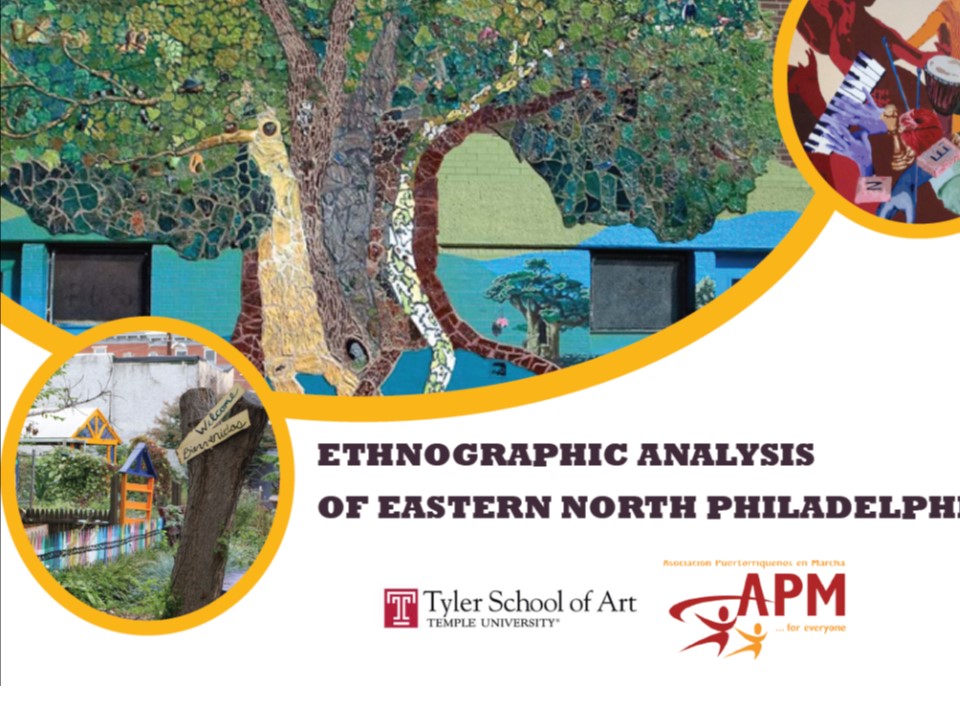The Tyler School of Art and Architecture's City & Regional Planning and Community Development programs offer two capstone courses in which students engage in a service-learning project. Students work directly with community leaders and residents to provide technical assistance, create a plan, or accomplish another type of activity. The capstone course in the BS Community Development is the Community Development Workshop and Planning Studio for the MS City and Regional Planning.
Graduate Planning Studios
The capstone Planning Studio course engages graduate students in a professional practice experience working directly with a client, often a community-based organization in Philadelphia.
2023
Overbrook Environmental Education Center: a plan to re-purpose vacant lots as an extension of their campus.
Full Report [PDF]
Executive Summary [PDF]
Presentation to OEEC [PDF]
Saving Lives with Lower Speeds: Partnering with DVRPC in research on the best practices to set safe speed limits, in furtherance of Vison Zero goals.
Full report [PDF]
Executive Summary [PDF]
Presentation to DVRPC and OTIS [PDF]
Philadelphia’s Street Eatery program: a response to the COVID-19 pandemic which has been adopted as a permanent program.
Full report [PDF]
Executive Summary [PDF]
Presentation to StreetBox PHL [PDF]
2022
All in the Family CDC: A Neighborhood Plan
Full Report [PDF]
Executive Summary [PDF]
Presentation to AITF [PDF]
Forging Ahead: A Vision for the Northeast Section of Valley Forge National Historical Park
Full report [PDF]
Executive Summary [PDF]
Presentation to VAFO [PDF]
2021
Benefits and Burdens: Case Studies in Transportation Equity in the Philadelphia Region
Full report, including all appendices [PDF]
Executive Summary [PDF]
- Sections:
Presentation to DVRPC Board, May 27, 2021 [PPT], [MP4]
Building Disaster Resilience for Philadelphia’s Commercial Corridors
Full Report, including appendices [PDF]
Executive Summary [PDF]
- Sections:
Community Development Workshop
2020
In Spring 2020, the Community Development Workshop continued to partner with Asociacion Puertorriquenos en Marcha (APM) to build on the success of the Spring 2019 project with the goal of developing a historic walking tour and hosting a walking tour for the community on April, 2020. Unfortunately, due to COVID 19, the tour was cancelled. For this project, the students also created a website so anyone could access the tour materials and do a self-guided tour or visit the sites virtually.
Discover Germantown Avenue website
Discover Germantown Avenue Walking Tour Introduction Video
Graduate Planning Project
2019
Graduate planning students collaborated on a single studio project, Crossing Lancaster. A Multimodal Transportation Safety Study of the Avenue.
This report was created by the 2019 Temple University Planning Studio team for the People’s Emergency Center (PEC). The purpose of this plan is to highlight the existing conditions for pedestrian and cyclist safety along Lancaster Avenue and provide PEC with the necessary information to obtain appropriate funding and partnerships with other city agencies and community groups that will help to improve safety along the corridor. Recommendations for improvements include both corridor wide suggestions as well as recommendations for individual intersections, including five significant strategies for responding to common issues: (1) Paint Mural and Artist Crosswalks, (2) Add Temporary Curb Extensions and Bumpouts, (3) Add Street Trees & Benches, (4) Repaint Crosswalks, Street Lines, and Direction Markings, and (5) Address Pinch Points and Obstructions.
Community Development Workshop
2019
In Spring 2019, the Community Development Workshop partnered with Asociacion Puertorriquenos en Marcha (APM) and designed and hosted a community event held on April 6, 2019 that engaged residents in learning about the history of the neighborhoods and envisioning the future of its main street: Germantown Avenue. The project was called "Remembering and Envisioning Germantown Ave."
Documentary Video Remembering & Envisioning Germantown Avenue by Graces Maas
Community Development Workshop
2017
Students in the Spring 2017 Community Development Workshop partnered with the Germantown United Community Development Corporation to develop adaptive resue recommendations for the closes Germantown High School. Community leaders participated in interviews to share their stories of the importance of the High School to the community and their ideas for its reuse. Based on this information, students researched possibilities for the future use of this building.
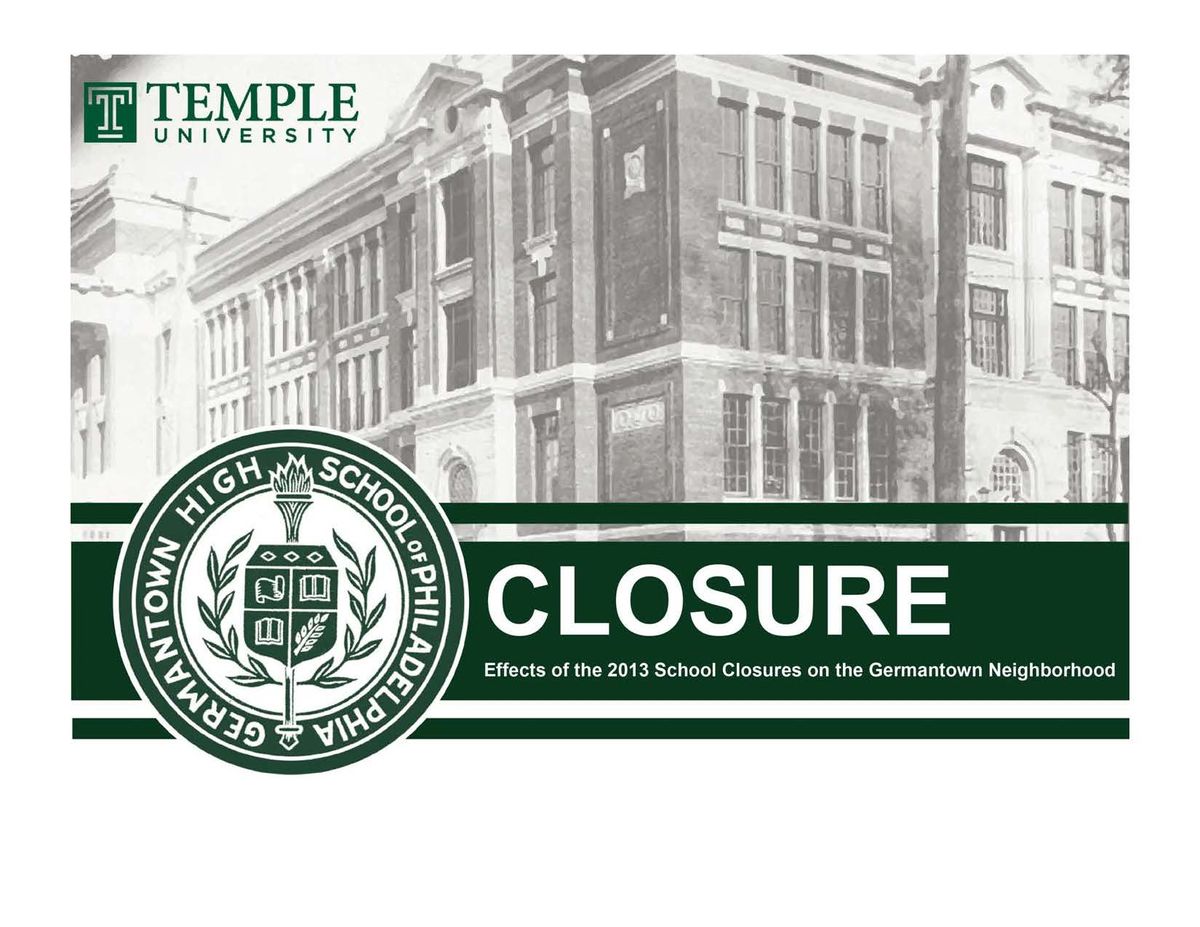
2016
Students in the Spring 2016 Community Development Workshop undertook an ethnographic analysis of community leaders and residents in the neighborhood adjacent to Temple's Main campus. The workshop partnered with Asociacion Puertorriquenos en Marcha, the Community Development Corporation responsible for improving living conditions in this neighborhood, which has experienced disinvestment and neglect. The study revealed how residents feel about their community and how they would like to make it a better place for all.
2015
The spring 2015 Community Development Workshop students developed a Green Neighborhood Tool Kit for two community partners: Asociacion Puertorriqunoes en Marcha and The People's Emergency Center. The Green Neighborhood Tool Kit identified environmental, social and economic initiatives the two communities partners could undertake to make their communities more sustainable and to enhance the quality of life of residents. The New Kensington Community Development Corporation's Sustainable 19125 program was the model for the student project.
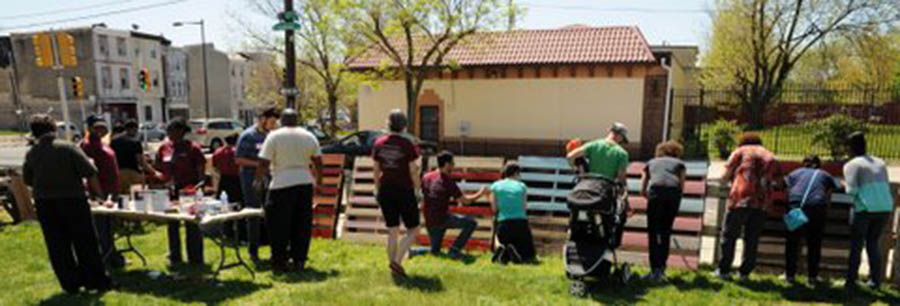
The workshop students also organized two community events to raise awareness of the Tool Kit and sustainability. With PEC connectors and community volunteers, the students painted reclaimed bricks to create a decorative border for a new planting bed at the information kiosk at 40th Street and Lancaster Avenue. With APM connectors and community volunteers. the students painted reclaimed shipping pallets and planted them with sedum - green roof type plants, to create Valla Verde, a green fence, beautifying a vacant lot at 6th and Diamond Streets.
Planning Studio
The capstone Planning Studio course engages graduate students in a professional practice experience working directly with a client, often a community-based organization in Philadelphia. The students' work has received awards for 5 consecutive years.
2016
This year the Graduate Planning Studio produced two award-winning reports. First Prize went to the Community Engagement for the Brownfield Area-Wide Plan and Second Prize went to the Division Street (Harrisburg) Revitalization study. For more information on these studio reports and the other studio project visit Dr. Jeffrey Doshna's website studio page.
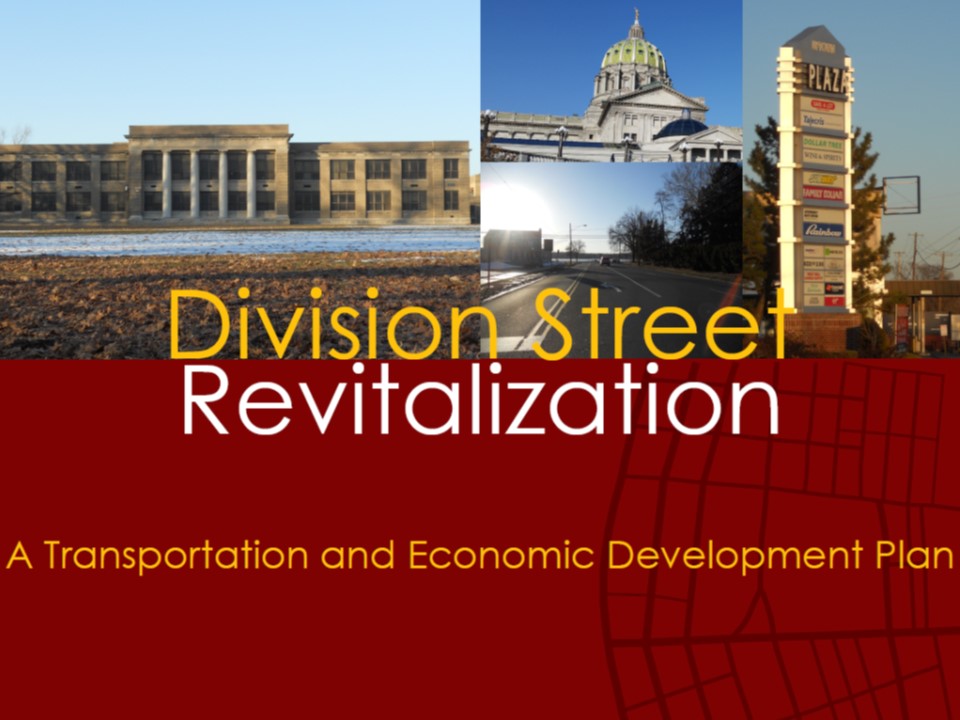
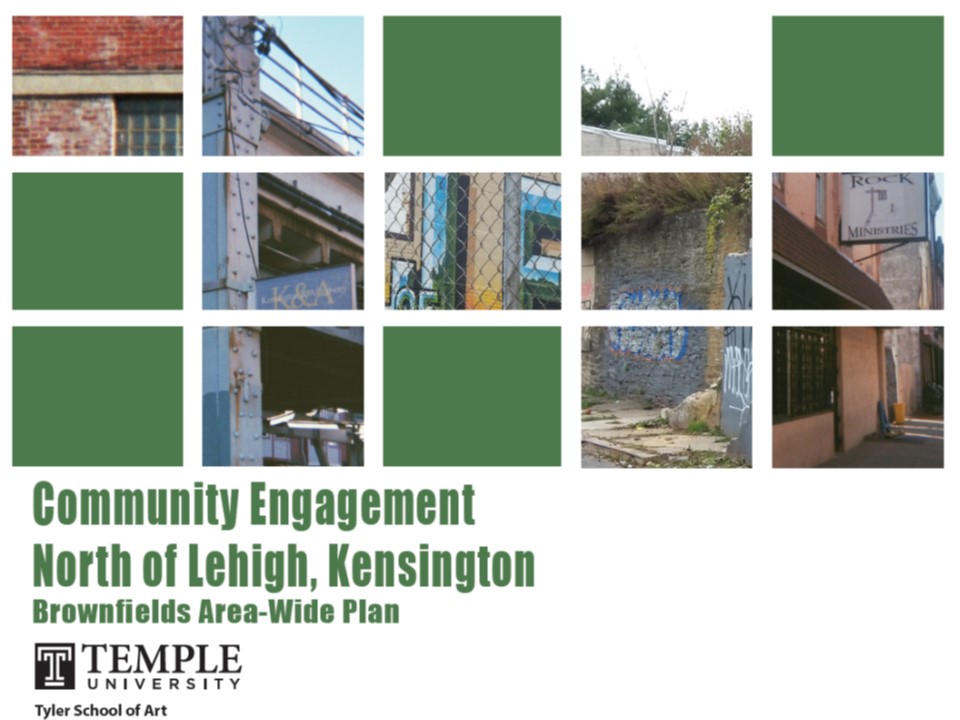
2015
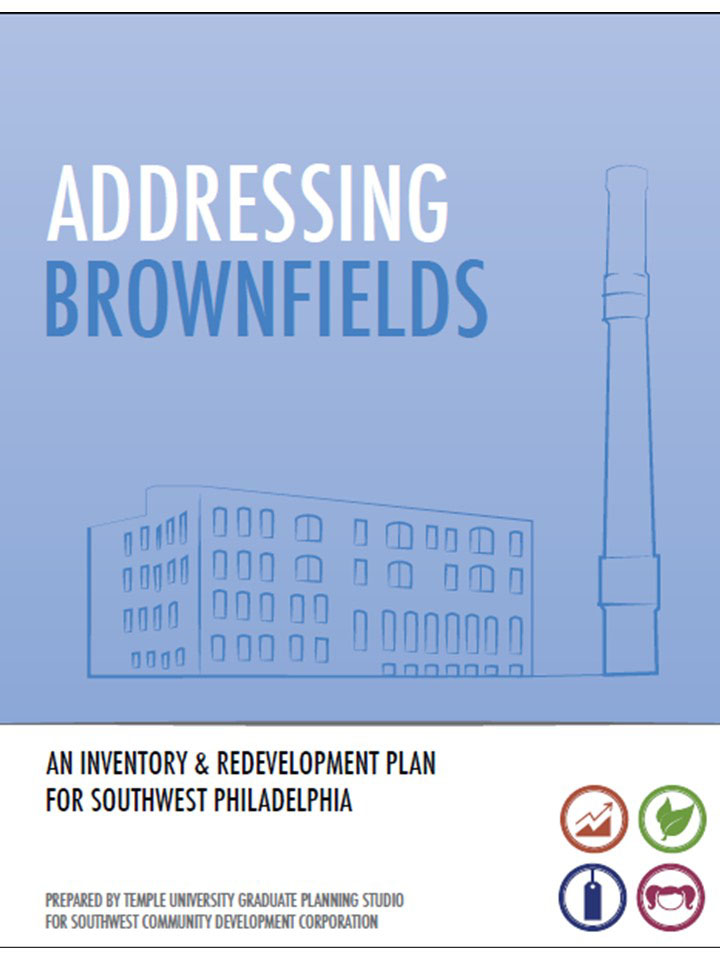
Addressing Brownfields: An Inventory & Redevelopment Plan for Southwest Philadelphia was prepared by the 2015 Temple University Graduate Planning Studio for the Southwest Community Development Corporation (Southwest CDC) as a reference tool to be used by the community as they engage in future redevelopment discussions. An unmet need of the Southwest CDC, this brownfields inventory is a key resource for identifying and prioritizing brownfields and other underutilized sites for reuse and redevelopment. Inventories like this can be challenging and time-consuming for communities to assemble; however, once created, they have the potential to provide great insight into future community planning and development efforts. Southwest Philadelphia has a history of industrial land use, which has left behind a legacy of environmental contamination as well as detrimental social and economic impacts.
Southeast Section of the Pennsylvania Chapter of the American Planning Association: 2015 Student Scholarship Award for a Group Paper
Text Credits: JDoshna
2014
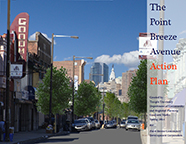
The Point Breeze Avenue Action Plan (the “Action Plan”) will serve as a guide to catalyze sustainable and equitable economic development in Point Breeze through the re-establishment of Point Breeze Avenue (“the Breeze”) as its primary commercial corridor within a five year timeframe. The Action Plan builds upon previous planning efforts, most notably two plans developed by Interface Studio in 2005 and 2009, with updated recommendations based on current conditions and planning best practices. The Action Plan is unique in its offering, providing specific tools and strategies to implement each recommendation. The Action Plan is intended to empower the community, the Point Breeze Community Development Corporation (Point Breeze CDC), and other partnering organizations to readily put the plan in motion.
The recommendations suggested in the Action Plan are intended to address residents and business owners who have received many promises of change, but have not yet experienced that progress. The Action Plan will unite the neighborhood through a series of programs and initiatives that will make Point Breeze a stronger, healthier, and more sustainable community. Specific focus was given to addressing the issues of economic revitalization, neighborhood partnerships, food access, streetscapes and transportation, vacant lots and, where appropriate, possible funding sources are provided. It is our hope that these recommendations will meet the needs of current and new residents while also providing the tools necessary in order to revitalize the commercial corridor along the Breeze.
Southeast Section of the Pennsylvania Chapter of the American Planning Association: Best Student Paper
Text Credits: JDoshna
2013
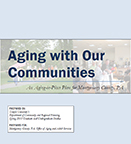
Aging with our Communities. The Spring 2013 Graduate Planning Studio was the culmination of the City & Regional Planning and Community Development programs' year-long focus on planning for aging communities. The demographic reality of the retiring ‘Baby Boom’ generation will place significant challenges on planners across the United States. The client, Montgomery County Office of Aging and Adult Services, like many area agencies on aging, lacked any significant capacity to engage in the comprehensive planning required to meet this challenge.
Also unique to this year’s studio was the combination of both the Graduate and Undergraduate sections, enabling the students to create a very significant planning document that addressed demographics, housing, transportation, services, and safety & security.
Pennsylvania Chapter of the American Planning Association: Best Student Project
Text Credits: JDoshna
